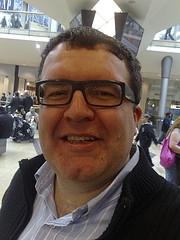“The secret of acting is sincerity. If you can fake that, you’ve got it made.” George Burns
Over the next few weeks, my MP (a newly-elected Tory) will go through the parliamentary lobby in support of a range of bills that he knows little about.
Sure. He may have a few reflexive opinions on the general subject matter, but beyond that, like most MPs, he’ll focus upon a handful of issues that he stays on top of: Personal bugbears, issues raised my his more persistent constituents, areas in which he’s been allocated a Parliamentary or Party role.
And however he casts his vote, the letters pages of the local newspapers will regularly castigate him. He’ll often respond by topping-and-tailing cut-and-paste letters provided by someone else in his party.
In this respect, my MP is quite like Tom Watson – the pin-up of the networked politics. I’m sure Tom toes The Party Line when he’s not sure. In other words, my MP and Tom conspire in the fakery that sustains Party politics.
I say that my local MP quite like Tom. But he’s also not quite the same. Earlier this summer, for instance, Tom attained a status that very few politicians have ever held. He could have walked into a bi-partisan pub and had drinks bought for him from all sides because he behaved in a way that most people think good MPs should.
But was Tom really a one-man force of nature – a campaigning multi-tasking up-all-night political polymath, on top of the details with carefully phrased rapier-like questions?
I yield to no-one in my admiration for him, but I really don’t think he was this superman. I say this because he did something a bit cleverer than that: He rode the network into battle. His 3,225 Facebook friends and 51,984 Twitter followers gave him extra eyes, ears, hands and brains. They allowed him to stretch his Parliamentary Allowance and give him all kinds of resources that he won’t need to claim for on annoying IPSA forms.
Sure – he worked hard and picked his fights well. But his real talent was in finding help – and not just of a material kind.
Where his followers weren’t slipping him data, they were chewing over the evidence, road-testing a few ways of describing developments giving him phrases that were useful when the cameras were on. When they were doing none of those things, he got feedback – encouragement and reassurance.
When you know you’re onto something, it gives you that extra bounce. His self-image here didn’t need to develop that self-loathing edge that sustains fake indignation. A politician as exposed as Tom would never get away with that these days.
By embedding himself in the network, he had little choice but to apply high standards of self-criticism. Either be a genuinely good guy, or act his socks off every day.
Now contrast Tom with Sir Stuart Bell – the unobtainable member for Middlesbrough.
Sir Stuart hasn’t held a constituency surgery for 14 years. He is made even harder to contact by the fact he doesn’t have a constituency office.
According to the paper, his response to questions about this has been to point out that he meets with members of the public by appointment instead, and people can reach him by telephone at any time.
So reporter Neil Macfarlane set about trying to find out how easy or otherwise it was to get in contact with the MP. Over several months, the Gazette rang Sir Stuart’s Westminster office and his home number over 100 times. No-one ever answered. That’s despite claiming staffing costs of £82,896 last year. Contrast that with Teesside’s four other MPs, all of who have their phones answered at the first attempt.
Sir Stuart isn’t on Facebook or Twitter either as far as I can see. And – when we find out what he thinks – I doubt if it’s ever as nuanced or road-tested as Tom’s positions. The contrast in self-awareness as well as political competence will be eye-watering.
So there’s a heirarchy here: On the top, Tom Watson, the go-to example of the networked politician.
Somewhat below him is my MP (no slouch with social media by the way, but as guarded as most MPs) who is in a marginal seat and is accordingly, visibly, busy.
Then, a long way further down, there’s Sir Stuart, who has managed to hide way for 14 years without hosting a surgery because, in Middlesbrough, they’d probably elect a Donkey if was wearing a red rosette (Tory equivalents are undoubtely available folks!).
I’m sorry it’s taken me to get to it, but here’s my question:
If you’re good at networking, are political parties as important
to you as they were? Does Tom need to get his cut-and-paste replies from Labour HQ as often? Does he need to rely upon the whips to guide him through issues he doesn’t understand as often? Does he need to scour local committee rooms get find local canvassers who will knock on doors for him at the next election?
And most importantly, Tom has created a situation where he has to behave publically like an honest human being. In being well networked, has he redefined what representation is?
And should we be voting for people on the basis of their personal network more than their party rosette?
Update: More on lazy politicians here.










You complain about your MP, and criticise his abilities and qualifications, as well you might. Like most branches of government, the H of C is unfit for purpose. The question is, how has this come about? is it inevitable ( I believe it is) : and most importantly, how can proper reform come about? I think I have novel ideas on this subject, and would welcome specific examples to incorporate into a book.